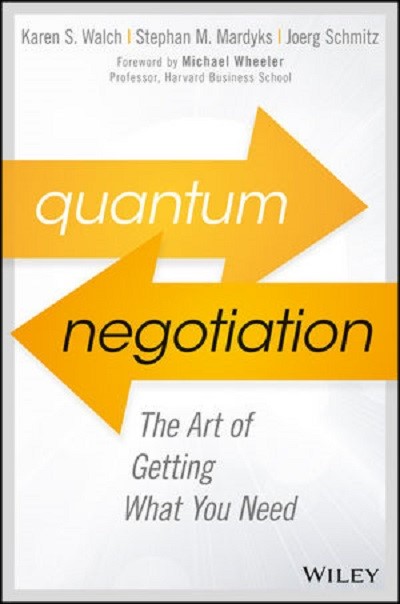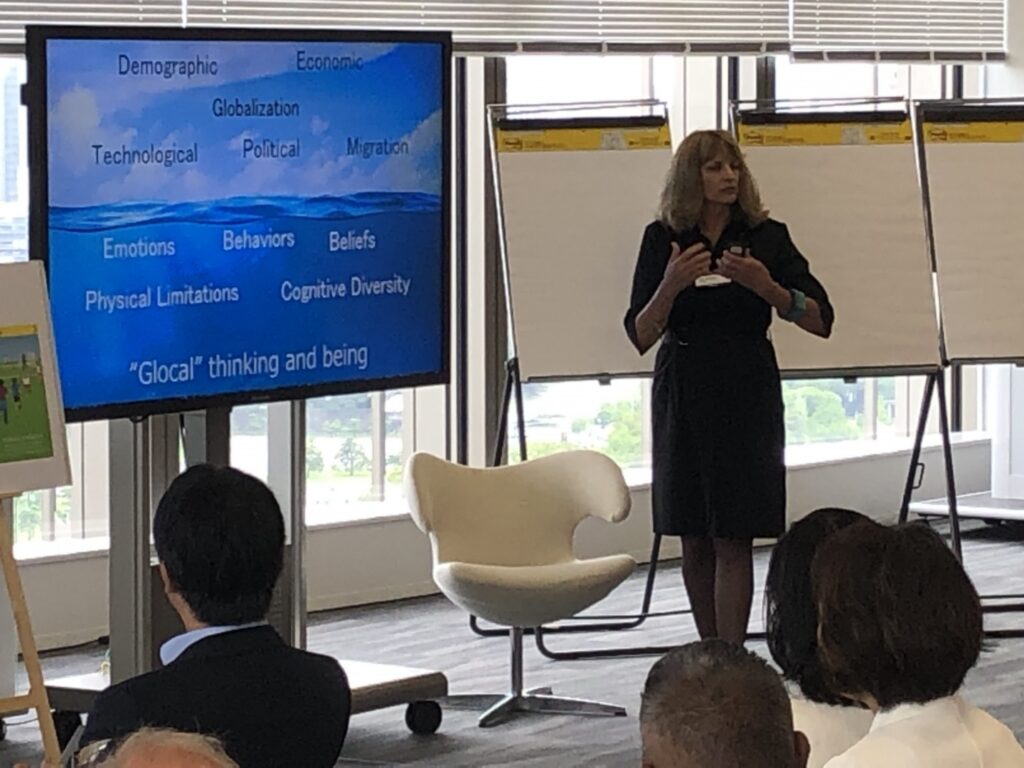
An interview with Karen Walch Ph.D., co‑creator of Quantum Negotiation®
At Womazing.eu, we believe visibility and collaboration are two of the most powerful tools for women entrepreneurs. But there’s another essential skill every female founder needs: negotiation.
Negotiation isn’t just about closing business deals – it’s about how we navigate relationships, leadership roles, and everyday decisions in ways that align with our values. Yet for many women, the word negotiation can feel heavy. Too often, the business world celebrates aggressive, “win‑at‑all‑costs” tactics that leave women feeling undervalued, unheard, or pressured to compromise.
That’s why we sat down with Dr. Karen Walch, PhD – internationally respected negotiation expert, co‑creator of the Quantum Negotiation® method, and long‑time advocate for power with approaches to leadership. In this conversation, Karen shares how women can develop negotiation skills that strengthen influence, build confidence, and create sustainable success – in business and in life.

– Let’s start with the basics. Why is negotiation such an important skill?
– Negotiation is part of what it means to be human. Every day, we make decisions, solve problems, share resources, and bring our ideas together with others. That means we are almost always negotiating – whether we call it that or not.
The truth is, negotiation is not just about sitting across a table from someone and hammering out a contract. It happens in the smallest moments of our daily lives: deciding how to divide responsibilities at home, advocating for a project at work, or finding common ground with a business partner.
When we need something – whether that’s resources, agreement, or support – we can feel vulnerable. That vulnerability often triggers anxiety, and anxiety can make us focus so much on getting what we want that we forget negotiation is about a relationship. Both parties bring needs, ideas, and value to the table. A lot of the work in negotiation has to do with understanding the nature of the relationship that you are in. Because often, we think we don’t have any power, or we don’t have any leverage. And some of the fundamentals in negotiation have to do with understanding that you are in a negotiation, that you have something, the other party has something, and there often are common needs, common goals.
Are we really in a negotiation situation when we don’t have any resources? But I’ve asked this question all around the world, and the more we talk about this, we discovered that that monopoly of power is more of a perception than it is real. And that’s a lot of what I’d like to talk about today because many of us don’t have that monopoly of power to be able to reward and punish others. But we seem to run into people who believe they have the authority to reward and punish us because they have all the resources to punish others.
So thinking of when we are in a negotiation, be conscious of it, and remember that you are not without leverage in a monopoly situation, because it’s about our perception. When you realize negotiation is about building a bridge – not winning a battle – it becomes less intimidating and much more empowering. That’s the foundation for everything else we’ll talk about today.
– Speaking from experience and from conversations with many women entrepreneurs and students, I’ve noticed that for women, it’s often even more difficult – not just to decide, but to assert ourselves in negotiations, whether in boardrooms or at universities. Why is this? Are we still facing deep structural challenges?
– Well, that’s a very long historical question, and you and I have talked about this a lot. Many of our researchers have been dominated by a more patriarchal, male dominated authority system. So it’s in our DNA to have experienced a more patriarchal, more authority comes from being male.
But over time and over all the studies I’ve done and the experiences I’ve had, we do know how to make social change, even when we don’t have all of that authority. And a lot of that has to do with how aware are you of yourself? And how do you understand these historical movements? And I think that’s what I’d like to really talk to you and all of your colleagues about today is when we do feel this kind of inability to have all the decision making authority, do we have any options at all? And really power is not about positional authority in the end. And let’s remember that a lot of it is perception.
–You often emphasize the importance of practice when it comes to negotiation. Today, many universities offer courses in negotiation, and historically, rhetoric and techné were core parts of education even in ancient times. Why does practicing negotiation help us – and how can these skills support us across different areas of life and career?
– I love that question. Why is it still so important? And we’ve been studying this for years, right? It’s interesting that in the world of negotiation where I came from in political science, it comes from the earliest days of diplomatic studies. So it’s something that is part of the human experience that we generally come into a situation feeling very vulnerable. And we learn to identify where there might be some areas where we could develop more power by asking more questions, by building alliances, by managing our own responses, to feel inferior or to feel vulnerable, and to forget how much leverage that we actually do have.
So practice is important because we can think about it. But yet when you get into that space where it looks like you don’t have any support, you’re vulnerable, your needs are not going to get met. When we think about how our brain works and our neural system works, that we generally become afraid, whether we’re conscious of it or not, and our behavior will default to defense or offense.
So what we find, especially in role plays, that’s why a lot of the work I did with training and education had to do with role plays. And over time, I actually found that one of the easiest ways that we can practice is to take some of the principles from applied improv. That is, how can we be put in a surprise situation? Think on our feet, but yet remember to make our partner look good, to remember to think of communication freezers like no or but, but continually use “YES”, “AND”.
I find that practice trains our nervous system to not feel so afraid in a surprise situation, or that anxiety when we’re in the group of people. How do we manage that? We can only manage that through practice. And that’s why I think it’s interesting in the world of diplomacy.
There’s a lot of practice. They want young diplomats to get a lot of practice. And that’s the same if you’re working as a negotiator for a company. You’ll get this opportunity to practice, because what you plan doesn’t always happen in reality, because of anxiety, because of our nervous system, which is very human. It’s a very human response.
– How is Quantum Negotiation different from manipulation?
– I would say that the biggest differentiation is that first of all, we’re going to spend some time in a quantum negotiation platform. We actually start thinking about the, first of all, the nature of the relationship. Do we need each other in somewhat similar ways? So that’s number one. If that’s true, then we can explore common interests, and we can actually go to a quantum level of exploring all the potential ideas we have together – versus thinking of a more manipulation coercive strategy, which oftentimes might get related more to what’s called rights-based strategies.
So, Quantum Negotiation begins with the relationship. We explore whether our needs are complementary, then we work through four dimensions:

This approach is about understanding both. The quantum area is really looking at who we are, not spending so much time on how we’re going to negotiate like the strategy and tactics. And we always will look at strategy and tactics are about how do I ask the right questions. How do I understand that in a negotiation, there’s a push energy, we have to state our demands, we have to close with what we need, but then there’s a pull energy. How do I know that a negotiation is going to have these different energies and I need to be able to style shift into one or the other. So it’s a lot of focus on who we are and who our counterpart is, and why are they negotiating, and it’s not just the agreement.
–You often say that there is no place without authority. And women often suffer under power structures that reward domination, or what you call “power over”. What alternative approaches to power do we have that is more sustainable and more inclusive?
– I love that question, and you know that “power over” and “power with” are two concepts I’ve studied academically, and that I have practice in my own personal experience, and I have a lot of stories of people who learn to move from power over to power with.
So in general, power with is using all domination, and a lot of times they’re called dirty tricks. What are some psychological tricks you can get somebody to be anxious to close, or get somebody anxious to give you what they need? Power with is how can I manage my nervous system so I can lead in an engaging discussion and exploration, where we can find what our real true needs are. And a lot of times our needs are unspoken.
For example, I’ve been working with someone recently that she was so concerned about getting what she needed or being legitimized in a negotiation with a colleague on a team that she just was so defensive the entire time, as opposed to she understood that she was very, very vulnerable. And she thought ‘I should use these power over domination and tricky tactics’, and it was exhausting and she got nowhere with it. So she decided to step back and realize that she never asked any question about the counterparts. She actually created more leverage in her team than people who had more structural authority than her. So she realized that, you know, my power isn’t dependent on whether I have authority or not. It depends on how well I ask questions.
–What role does emotional intelligence play in negotiation?
– Emotional intelligence is contagious. A leader who brings calm curiosity into a negotiation creates space for cooperation. A leader who brings fear or anger shuts it down. In my work, I’ve seen that leaders who manage their own emotional state – even under intense pressure – are far more successful in creating trust and collaboration. All of us need to be aware that there are some leaders who use fear to get us to be afraid all the time, and need to yield to that dominance and to that authority.
You can see that it doesn’t give you any power, really, and that you aren’t going to get your needs met, but you can find others who do understand your need to engage and be curious. So, I know it feels some days that women don’t have structural authority, but we have changed the world in so many ways. And I think there’s a lot more work needs to be done on just exploring how much leverage and how many resources women have brought to both work, political and neighborhood and home situations.
– Economist Linda Scott, in her Double X Economy theory, points to aggression, speculation, and abuse of power as persistent forces in business and politics. And we see it even in academia. I’ve read and heard from colleagues -and experienced myself -how certain environments still educate people to underestimate women. In fields where women are talented and increasingly present, how can we protect ourselves when we encounter this? And is it even possible to sit at the negotiation table under these conditions?
– Yeah, I totally believe that. And I know that the progress has been relatively slow. But just as examples in my own lifetime: it was very difficult for women in male dominated careers. And a lot of us went into those – and it was a struggle, because the fundamental assumptions for me around power, we’re not “power over”. So it was hard to come into academia, for example, and adopt this approach toward power as “power with”. But when you do the research, you find that there’s a lot of scholars who have been talking about this for a very long time.
Our job is to open our eyes to where all the partnerships are, because there are. So I guess that would be my first, which I had to learn myself was, it’s not all, it’s not all lost. It’s moving slow, but in my lifetime I’ve seen a lot of changes, more women in medical, more women in technical work and there’s more women in law schools now today than there ever had been. So, it’s very very slow and social change, but it’s happening because women have built alliances, and that doesn’t mean just with women, it means with men who really understand partnership makes their careers, makes their families, makes their companies stronger and healthier. So, it’s almost like a mind shift.
And don’t forget, you all have more leverage than you think. You have your youth, your education, your contacts, your ability to navigate in a new complex world. You have a lot of resources to bring.
So, I think a lot of preparation is really building up all of those capitals that you have. You have strong intellectual capital, emotional capital. You know how to behave with your social and spiritual capital.

– I think it’s very important to note that negotiation can be learned: it is possible to realize when you have a difficult conversation or discussion how you can behave or what choices have you used your resources or your power. If we are not aware of our choices or our possibilities that we have, it’s very difficult to navigate ourselves even in career later on.
– Absolutely. You said a really powerful word, and that is choices. You have so many choices because you are young and talented and connected, and you have all of this energy that you have more choices than you think you do.It sounds like a paradox, but quantum is a paradox – that we are basically nothing, yet we’re everything. In quantum, we also have this ability where you might not see any possibilities, but if you start to engage with another, you open up limitless possibilities.
And so you have limitless possibilities. The other thing is, you also know how to say no. And sometimes I find that that’s one of the biggest lessons a lot of my coaches learn is that when I know what my values are, how I think, behave, how I want to feel, how I want my physical health to feel, and how spiritually I want to have meaning in my life, I get to say no.
And that’s why knowing you have choices, you get to say no to those areas where you don’t seem to have any possibilities. And that’s why you start out with the best case scenario. The best case is ‘I’m going to collaborate.’ I’m going to contribute. I’m going to expose possibilities, even if I don’t have structural authority. I’m going to bring my leadership.
And you might get to the place where, and I know you and I have talked about both examples, we both have had examples, where everything that you’ve tried hasn’t worked, and you still aren’t getting what you need. And it isn’t good for your health. It isn’t good for your well-being. Then you search your alternatives.
– What if walking away feels like losing?
–That’s one of the most persistent myths. Walking away is not losing – it’s choosing yourself. I’ve seen countless women leave toxic negotiations or environments only to thrive elsewhere. The moment you recognize that an agreement will cost you more than it gives you, walking away becomes an act of strength.
– Yes. But when you lose, let’s say, lose negotiation, when you are in business, it can feel very frustrating. But still, did you see good examples after that they had a better option, really, this quantum negotiation method?
– Yes, many stories like that. If the person who comes in really knows what they want and knows what their walk away is and knows what their alternatives is, none of those dirty tricks work. That’s true. So, I have found that interviewing many people who work at big companies, that relationship building works better, rather than trying to manipulate somebody into a bad deal. Because then they have a long term relationship. They keep coming back, the client keeps coming back, year after year, or they bring their mother or they bring their sister and they basically have marketing built into a good, meaningful sale in a relationship.
– Of course, high pressure negotiations happen to everyone, regardless of gender, but how can we prepare for them?
– It’s like, you know, you’ve heard the saying in all of our wellness work is like, you might be afraid, but still show up, right? Practice just showing up, and you may not actually do as well as you hoped you would, but then you keep practicing.
And that’s why I love two things I would say about that. One is the whole world of positive psychology, which is, let’s say you practice all the positivity, you anchor yourself, you’re ready to behave, and you get into that negotiation. And right away, you can see that they set it up to be manipulative: your chair is really low, have the heat on really high. They have four people there that you didn’t expect to be there. Just the optics are trying to make you afraid right there.
So you plan for that, that if that happens, you can plan for that piece. And that might happen to you in that negotiation. So in positive psychology, we basically say if I didn’t do well in that negotiation or that meeting, you say, I am not a failure. You say I’m going to prepare better next time. And you keep practicing.

– Tell us about your Social Intelligence Lab. How do you practice there? Because it offers some ways to develop these skills from empathy to non-coercive negotiation. So how do you practice online?
– The Lab is a global learning community where people come to strengthen their negotiation and relationship skills. We use the VARK model – Visual, Auditory, Reading, Kinesthetic – so every type of learner can grow.
The Lab’s mission is to help people unlearn coercive habits and replace them with sustainable, collaborative approaches. I really believe in the Scoial Intelligence Lab idea and there’s a lot of teaching materials and coaching and we’re building a peer network and it’s fascinating because there’s people from all over the world and from many different fields.
When we talk about business and leadership, many still assume a “power over” mindset brings results. But as you Karen has shown, “power with” creates lasting impact and real change. The international Social Intelligence Lab platform offers practical ways to develop these crucial life skills – from empathy to non-coercive neagotiation. through guided practice and reflection.